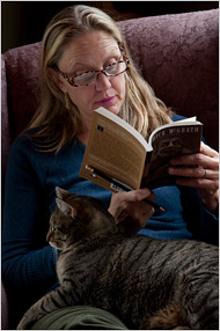 From October 2008 to October 2009, Nina Sankovitch read one book a day and wrote about it on her blog, Read All Day. After learning about this project in a New York Times article, I went to Nina’s site and found some terrific insights into what makes a book great – so I asked Nina if I could adapt them here:
From October 2008 to October 2009, Nina Sankovitch read one book a day and wrote about it on her blog, Read All Day. After learning about this project in a New York Times article, I went to Nina’s site and found some terrific insights into what makes a book great – so I asked Nina if I could adapt them here:
The traits of great writing are: genuineness, truth, fearlessness. Say it out loud: no fear. Let your words flap in the wind and light up the sky and bring in the readers, like a boat into a harbor. Write straight and true and without a safety net. No safety net! All the books I’ve read and loved have taken a chance and won. They won me over with their honesty and beauty. And I know the hard, hard work that goes into making a novel or a memoir or a short story or a poem. Only hard work and unfettered talent can make such beautiful and moving works of words.
An author who writes without fear – of rejection, of rebuke, of ineptitude, of foolishness or seriousness – can write a great book. If the writer is free of fear, she can go out there and express every aspect of a story, the smells of the characters, the sight of the places, the nature of the emotions, and the pull of the struggle being waged for or against the characters.
Why does greatness matter? It matters not only because reading such books is a pleasure but also because a great book presents the world in a whole new way. Not the whole world, necessarily, but a piece of the world, or a person or a thought, presented in such a way that the reader has not thought of before. Seeing an issue or a person or a situation from a new angle changes the way your mind works, enlarges your mind and enlivens it, as well.
A great story makes us care, heart and soul, about the movement, the struggle, the change. We care when the characters are genuinely portrayed, when just a slight detail can define a whole person. We care when the place where the story takes place breathes for us; when it is alive and it cradles or rejects the characters within its orbit: think of the Croatia of Josip Novakovich, the Brazil of Paul Coutinho, or the Ireland of Claire Keegan: “On either side, the trees are all and here the wind is strangely human. A tender speech is combing through the willows. In a bare whisper, the elms lean. Something about the place conjures up the ancient past: the hound, the spear, the spinning wheel” (from Walk the Blue Fields). I could be in all those places and know someone who lived and struggled, and I am more, I am richer for having been there, having known the people and the struggle and the outcome.
The best books are the ones that do not follow a formula or try too hard to be a certain genre. When I read a book I know when I am being manipulated and when I am being told a truth. The best stories present a truth about life in any way that the author finds best, even if it is in lies. An author has to be fearless in just not worrying about the verisimilitude of the story, or is it too romantic, too gross, too quiet or too loud. She has to write without fear of refusal.
Between reader and writer there is a kind of pact. The pact is that the writer will lay out his/her genuine thoughts and ideas through the medium of the best words and characters and plot he/she can work out, and that the reader will commit to reading the result. I believe that in my year of reading my brain has become more robust and energized, and life all around me is better. The writer of a great book gives us, the readers, a new tank of oxygen, allowing us to dive again and again into life. Great good comes from reading great books.
Since finishing her year of reading, Nina Sankovitch has been writing a book blog for The Huffington Post. Recently she signed a contract with HarperStudio to write Tolstoy and the Purple Chair, a book about her year of magical reading.

 See
See 